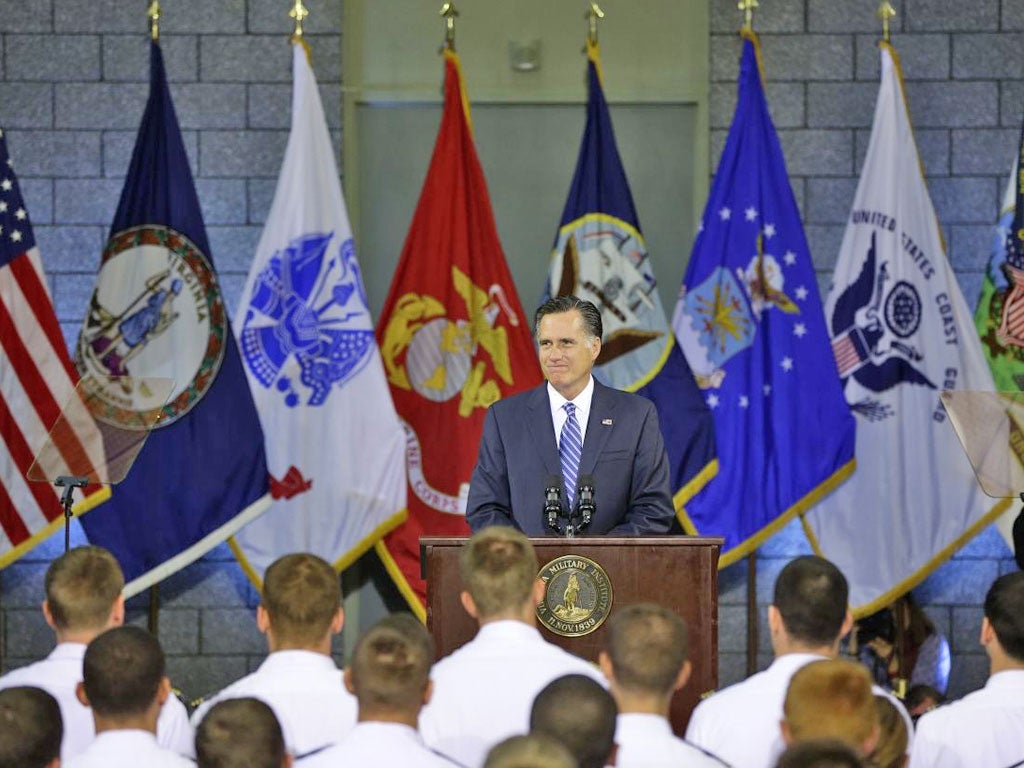Mitt Romney's reboot gathers pace with attack on Barack Obama's foreign policy
Latest poll puts the Republican candidate four points clear of President

Your support helps us to tell the story
From reproductive rights to climate change to Big Tech, The Independent is on the ground when the story is developing. Whether it's investigating the financials of Elon Musk's pro-Trump PAC or producing our latest documentary, 'The A Word', which shines a light on the American women fighting for reproductive rights, we know how important it is to parse out the facts from the messaging.
At such a critical moment in US history, we need reporters on the ground. Your donation allows us to keep sending journalists to speak to both sides of the story.
The Independent is trusted by Americans across the entire political spectrum. And unlike many other quality news outlets, we choose not to lock Americans out of our reporting and analysis with paywalls. We believe quality journalism should be available to everyone, paid for by those who can afford it.
Your support makes all the difference.Mitt Romney, who is gaining new traction in the US election race, offered to revive a foreign policy vision of projecting American influence through military dominance and unflinching resolve, an approach, he said, that had been forsaken by President Barack Obama.
Citing the recent attacks on the US consulate in Libya, the conflict in Syria and broader turmoil in the Middle East, Mr Romney suggested that Mr Obama had instead lead with "passivity".
Before an audience of military cadets in Virginia, he said: "I know the President hopes for a safer, freer, and a more prosperous Middle East allied with the United States. I share this hope. But hope is not a strategy."
The speech was Mr Romney's latest attempt to shore up his foreign policy credentials that otherwise have been undermined by serial perceived campaign missteps, including when he questioned Britain's ability to stage the Olympics, made remarks about different cultures that offended the Palestinians, and arguably bungled with a partisan initial response to the killing of Chris Stevens, US Ambassador in Libya.
"We're not going to be lectured by someone who has been an unmitigated disaster on foreign policy every time he's dipped his toe in the foreign policy waters," Jen Psaki, a spokesman for the Obama campaign, said ahead of Mr Romney's address.
But a new sense of confidence has seeped through Team Romney since the strong reviews for his debate performance last week. A poll for the Pew Research Centre released last night showed him surging ahead of Mr Obama among likely voters with 49 per cent against 45 per cent for the President. That is a 12-point swing since the last Pew poll in September.
Other polls showed a smaller, but nonetheless significant improvement. Gallup yesterday put the two rivals even nationally, at 47 per cent, while battleground polls showed them similarly tied in battleground states like Florida and Virginia.
At a fundraiser on Sunday, Mr Obama joked about his underwhelming debate performance during a speech about musicians who had entertained guests. "Everybody here are just incredible professionals," he said. "They're such great friends and they just perform flawlessly night after night. I can't always say the same."
Mr Romney's speech was light on specifics, for example on hotspots like Syria and Iran. On the former he spoke of working with partners to aid the rebels and "ensure they obtain the arms they need", but did not say if the US would supply weapons. On Middle East peace he said only that a new president could give fresh energy to the process.
Meanwhile, the speech was long on critiques of Mr Obama. "It is the responsibility of our President to use America's great power to shape history – not to lead from behind, leaving our destiny at the mercy of events. Unfortunately, that is exactly where we find ourselves in the Middle East under President Obama."
If he becomes president, Mr Romney will also have to deal with deep schisms on foreign policy within his own party. There is a neo-con faction led notably by former US Ambassador John Bolton fighting for influence, and more moderate voices that include Robert Zoellick, head of Romney's national-security transition team.
Join our commenting forum
Join thought-provoking conversations, follow other Independent readers and see their replies
Comments